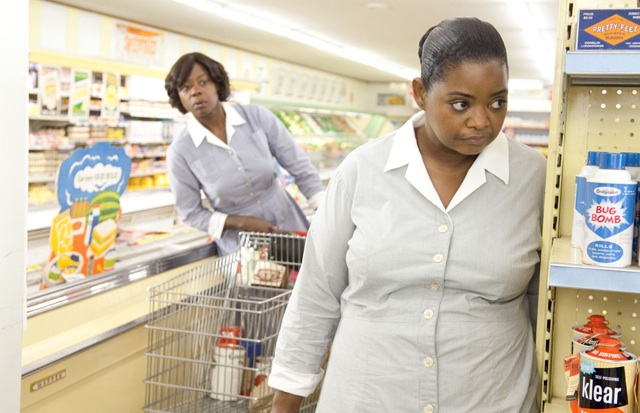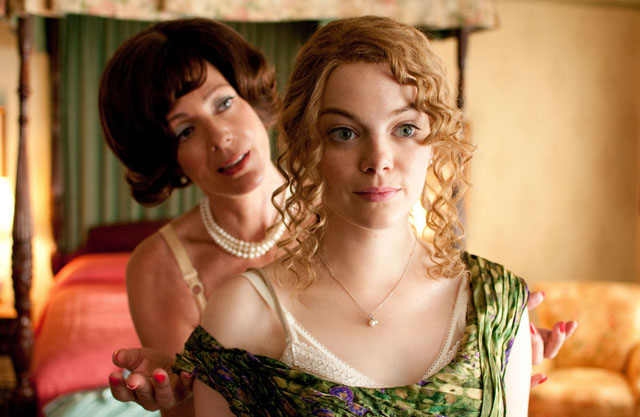CHICAGO – In anticipation of the scariest week of the year, HollywoodChicago.com launches its 2024 Movie Gifts series, which will suggest DVDs and collections for holiday giving.
Emma Stone, Viola Davis Lend a Hand to ‘The Help’
 Rating: 3.5/5.0 |
CHICAGO – Using fiction to express the importance of real historical events is seductive and sometimes disingenuous. The new film “The Help” manages to counteract that notion through high level, emotional performances.
Based on the bestselling novel by Kathryn Stockett, the film version of The Help brings to life the story of a young female Mississippi college grad, because she wants something more for her life, taking a risk by collecting the stories of African American maids during the early 1960s civil rights era. Although the events in the narrative may have been impossible, given the real-life situation in the South at the time, the emotional portrayals and sincerity of the characters make for a truncated lesson in tolerance and acceptance.
Skeeter (Emma Stone) has just graduated from the University of Mississippi in 1962. Coming back to her hometown of Jackson, she sees the potential rut of her life through her married friends like Hilly (Bryce Dallas Howard). After getting a job writing an advice column for housewives about cleaning, she seeks out a local maid named Aibileen (Viola Davis) to help her with the tips. In Aibileen she sees something more, and to impress a book editor in New York City she pitches the idea of writing about the experiences of African American maids in the South, and calling the book “The Help.”
 Photo credit: Dale Robinette for DreamWorks Pictures |
This pursuit has not shaken the quest of her mother (Allison Janney) to find her a husband, nor does the book get off the ground until Minny (Octavia Spencer) comes aboard. The writing, publishing and reaction to the book is the foundation of the story, filled with characters like a wannabe belle named Celia (Jessica Chastain), the eccentric Southern matriarch Missus Walters (Sissy Spacek) and memories of Skeeter’s own caregiver, Constantine (Cicely Tyson).
This is a parallel universe Jackson, Mississippi, of the early 1960s. Jackson was a flash point for civil rights unrest when leader Medgar Evers was executed in front of his home (which is depicted in the background of The Help). It would be hard to imagine a white college educated woman risking everything by exposing her hometown in such a way. There are reasons that the African American maids start to talk, but the atmosphere also means they are risking their lives. Kathryn Stockett’s novel aside, it would seem that the truth of the situation and time would be more interesting than the heroic tale that never could have happened.
Regardless, the performances are top notch. Viola Davis gives the perfect understated portrayal as Aibeleen, who figures out ‘when you ain’t got nothing, you’ve got nothing to lose.’ She is contrasted by the brash courage of Octavia Spencer’s Minny, who finds her own ways to cope with segregation and life’s unfairness, thereby evening out the playing field. Emma Stone stays on her star track with a balanced performance as Skeeter, who is vulnerable to her loneliness but never fails to remember how she got to where she is. Even the villain Hilly, as exposed through the filter of Bryce Dallas Howard, shows flashes of her own insecurity while striving to make sure everyone builds separate bathrooms for their maids.
There were some diverting choices for Skeeter’s mother, played by Alison Janney. In the book the character was much harsher and more developed, in the film her cruelty is just reduced to nagging. And the adapted screenplay also makes a decision to have the mother experience an unnecessary redemption towards the end, which weakens her motivations. Janney is a terrific character actor, but seemed caught off guard as to what to do with the mother character.
 Photo credit: Dale Robinette for DreamWorks Pictures |
Another saving grace for the film is the raw emotions the film satisfies. The divisive elements of segregation still linger today, despite electing Barack Obama as president. The persons screaming they want “their” country back, are rooted in the 1960s-era mistrust that “other people” are somehow inferior. But as individuals, we all have different instincts when it comes to our receptors. There are good people in all eras, willing to courageously admit they are wrong, or to at least empathize with the plight of unfair treatment. The Help does a superior job of highlighting that courage, which in essence spread throughout the whole civil rights movement and made it a success.
The battle of “why can’t we just get along” continues, propagated by a well-funded war of words, distractions and unbalanced laws. There are votes to be had with this strategy of divisiveness, and more time is wasted trying to unbend the golden rule in the name of power than is given to its practice. The Help, at least, fights against that tide of mistrust that everyone needs to get over, so the dream of getting along can flourish.
 | By PATRICK McDONALD |


